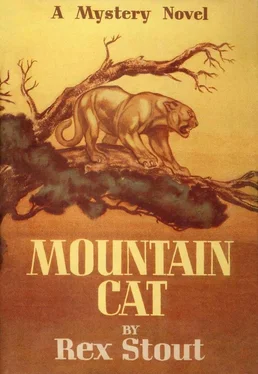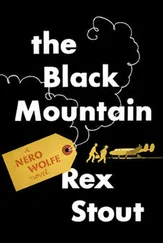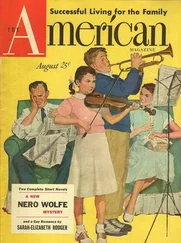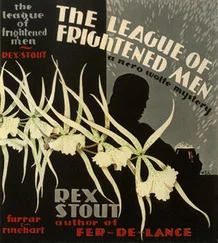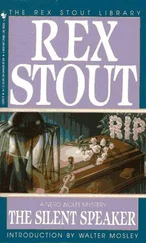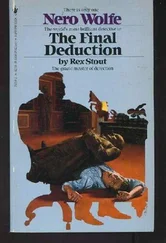“You must be pretty short on friends, with all the looking you’ve done. You were here when I came, nearly four hours ago, and you’re still here. Why don’t you try some other spot a while?”
“I’m doing no harm. The sidewalk is public property.”
“So it is. What does your friend look like?”
The man with the mustache shook his head. The assistant manager eyed him a moment, then turned and strolled down the sidewalk some thirty paces until he met a policeman in uniform. They exchanged nods and the assistant manager asked, “Have you seen that bird with the handlebars taking root in front of my place?”
“Sure I’ve seen him. All day. He says he’s looking for a friend.”
“How about advising him to go look somewhere else?”
“I suppose I could.” The cop grinned. “What’s the matter, you afraid he’s a G-man with a line on that two bits somebody lost?”
The deadpan didn’t respond to the grin. “I just don’t like it how patient he is. With Jackson murdered upstairs last night, the place has had enough of the wrong kind of advertising. One reason I asked, I thought maybe he was a gumshoe working on the murder.”
The cop shook his head. “Not a member of this club. He don’t look ferocious. I’ll keep an eye on him.”
The assistant manager, accepting that assurance, retraced his steps, re-entered The Haven and resumed his duties in the service of society. The cop sauntered after him, keeping close to the buildings for shade, approached the man in the niche and inquired casually, “Your friend show up yet?”
“Not yet. Thanks.”
The cop sauntered on.
Thirty minutes later, when the little disturbance occurred, the cop was across the street listening to a man cussing at a flat tire and therefore missed the preamble of the brief climax to the man’s long vigil. It was all over in no time at all. The man with the mustache suddenly and abruptly left his niche, moving to intercept a husky-looking young man, rather shabbily dressed, who, coming along the sidewalk from the north, had altered his course with the evident intention of entering The Haven.
The man with the mustache, blocking the young man’s path, said urgently, “I want a talk with you, young fellow. There’ll be a reward in it. Now don’t start—”
The young man shied back, ready, it appeared, to bolt. The man with the mustache sprang and seized his arm, getting a good grip. The young man’s right fist swung and landed square on the other’s jaw. The man with the mustache dropped to the concrete, rolling, and his assailant leaped back, wheeled and scooted like a deer down the sidewalk, nearly knocking a woman over, swerving to disappear into a narrow alley forty feet away.
Passersby collected and one of them stooped to give the fallen man a hand. Disregarding it, he scrambled to his feet, looked around with glassy eyes, and demanded, “Where is he? Which way did he go?”
A dozen voices answered him at once. The cop, having trotted across the street, took him by the elbow and observed sarcastically, “A swell friend that was you were looking for. Come along with me.”
“He got away! I’ve got to catch him!”
“We’ll catch one at a time, starting with you. Come along.”
“You damned fool!” The man grimaced, worked his jaw, and grimaced again. “You know me! I’m Quinby Pellett!”
“Yeah? Where’d you get the lip grass?”
“Oh, for God’s sake.” The man took hold of his mustache and gave it a jerk, and it was gone. “Which way did he go, damn it? I have to find him!”
“He’s out in the sagebrush by now.” The cop had released the elbow, but he looked neither sympathetic nor amused. “What’s the idea of the handmade tassel? — Hey, wait a minute, where you going?”
“None of your business! Turn loose of me! I’m going to see Frank Phelan.”
“Okay. Come on, folks, let us by, open up there! I think I’d better go along, Mr. Pellett. If you happened to run across any more friends of yours on the way, you might not make it.”
Quinby Pellett offered no objection as the policeman climbed in beside him on the seat of his dilapidated coupé, parked around the corner on Garfield Street. He got into the channel of the traffic stream and drove with the apparent assumption that he was an ambulance.
“You know, I could give you a ticket anyway, sitting right here,” the cop observed.
Pellett stopped working his jaw long enough to grunt.
They went to the police station, and were informed that the chief was out and might be at the courthouse. Upon Pellett’s refusal to converse with the lieutenant in charge, a phone call to the courthouse got the information that Phelan was there in the sheriff’s office, so they returned to the coupé and drove to the courthouse, missing fenders by inches on the way. They tramped down the dim basement corridor. The man in the anteroom told them the chief and the sheriff were busy and they would have to wait; then, obviously impressed by Pellett’s violent reaction, used the phone, nodded toward the rear, and told them to go on in.
Bill Tuttle was seated at his desk. Two men who looked like detectives, which was what they were, stood at the opposite side of the desk. Phelan, in a chair not far from Tuttle, frowning at the newcomers as they entered, spoke:
“Hello, Quin. What’s on your mind?”
The cop put in, “First I think I ought to tell you, Chief. He’s been standing all day in front of The Haven, wearing a phony mustache, looking for a friend, he said—”
“Go on and chew the rag while he digs himself a hole,” Pellett said bitterly.
“Spill it, Quin, we’re busy. Who’s digging a hole?”
“A man I tried to collar. By this time he’s to hell and gone for the hills.”
“Not him,” said the cop scornfully. “That bum wouldn’t get more than a mile from a pavement—”
“What bum?”
“The one that socked you. Al Rowley, his name is.”
Pellett gaped. “Do you mean to say you know him?”
“Sure I know him. He’s one of those—”
“Then find him! Get him!”
“That wouldn’t be—”
“Get him, damn it!”
“Keep your shirt on, Quin.” Phelan sounded impatient. “If the boys know him they can get him. Then what do they do with him?”
Pellett went to a chair and sat. “Listen, Frank. I’ll tell you about it. But first tell them to get that man. Have you ever known me to take a fool hen for a grouse? Tell them to get him.”
Phelan turned. “Who is he, Tom?”
“His name’s Al Rowley,” said the cop. “He came in with that carnival last year, the one that busted, and he’s been hanging around ever since, mostly at one of the joints on Bucket Street. Every once in a while he gets ahold of a buck, I don’t know how, and makes a deposit at The Haven.”
“Do the boys all know him by sight?”
“Sure, he’s one of our most prominent citizens.”
Phelan requested Tuttle’s phone, got it, called the station and asked for the lieutenant in charge. After a few concise but thorough instructions, he hung up and shoved the phone back and turned to Pellett.
“All right, Quin, they’ll get him. Now spill it. What’s he done besides sock you?”
“He stole my niece’s bag from her car yesterday afternoon.”
Bill Tuttle jerked into a stare. Everybody stared. The cop said involuntarily, “Ouch!” Phelan demanded, “This bum — stole her bag? Delia Brand’s bag?”
“Yes.”
“The one with the gun and the cartridges in it?”
“Yes.”
The sheriff broke in, snapping, “How do you know he did?”
“I saw him.”
“You saw him take it?”
“Yes.”
“You saw him take it and you didn’t mention anything about it here this morning?”
Читать дальше
